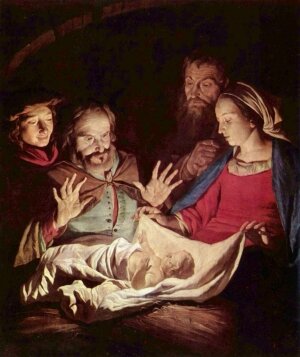 This article is about Jesus the man, based upon historical methods to reconstruct a biography of his life and times. For disputes about the existence of Jesus and reliability of ancient texts relating to him, see historicity of Jesus. For theological perspectives, see Jesus, chronology of Jesus, genealogy of Jesus, etc.
This article is about Jesus the man, based upon historical methods to reconstruct a biography of his life and times. For disputes about the existence of Jesus and reliability of ancient texts relating to him, see historicity of Jesus. For theological perspectives, see Jesus, chronology of Jesus, genealogy of Jesus, etc.The historical Jesus is Jesus of Nazareth as reconstructed by historians (i.e. not necessarily and usually not Christian historians) using historical methods. These historical methods use critical analysis of gospel texts as the primary source for the biography of Jesus, along with non-biblical sources to reconstruct the historical context of first-century Judea. These methods do not include theological or religious axioms, such as biblical inerrancy. Though the reconstructions vary, they generally agree on these basic points: Jesus was a Jewish teacher who attracted a small following of Galileans and, after a period of ministry, was crucified by the Romans in the Iudaea Province during the governorship of Pontius Pilate. The quest for the historical Jesus began with the work of Hermann Samuel Reimarus. Eusebius of Caesarea (~275–339) is an example of an early Christian historian and Flavius Josephus is an example of a 1st-century Jewish historian.
More...


2 comments:
"Historical Jesus"?!?
Just using this contra-historical oxymoron (demonstrated by the eminent late Oxford historian, James Parkes, The Conflict of the Church and the Synagogue) exposes your Christian-blinkered agenda--dependent upon 4th-century, gentile, Hellenist sources.
While scholars debate the provenance of the original accounts upon which the earliest extant (4th century, even fragments are post-135 C.E.), Roman gentile, Hellenist-redacted versions were based, there is not one fragment, not even one letter of the NT that derives DIRECTLY from the 1st-century Pharisee Jews who followed the Pharisee Ribi Yehoshua.
Historians like Parkes, et al., have demonstrated incontestably that 4th-century Roman Christianity was the 180° polar antithesis of 1st-century Judaism of ALL Pharisee Ribis. The earliest (post-135 C.E.) true Christians were viciously antinomian (ANTI-Torah), claiming to supersede and displace Torah, Judaism and ("spiritual) Israel and Jews. In soberest terms, ORIGINAL Christianity was anti-Torah from the start while DSS (viz., 4Q MMT) and ALL other Judaic documentation PROVE that ALL 1st-century Pharisees were PRO-Torah.
There is a mountain of historical Judaic information Christians have refused to deal with, at: www.netzarim.co.il (see, especially, their History Museum pages beginning with "30-99 C.E.").
Original Christianity = ANTI-Torah. Ribi Yehoshua and his Netzarim, like all other Pharisees, were PRO-Torah. Intractable contradiction.
Building a Roman image from Hellenist hearsay accounts, decades after the death of the 1st-century Pharisee Ribi, and after a forcible ouster, by Hellenist Roman gentiles, of his original Jewish followers (135 C.E., documented by Eusebius), based on writings of a Hellenist Jew excised as an apostate by the original Jewish followers (documented by Eusebius) is circular reasoning through gentile-Roman Hellenist lenses.
What the historical Pharisee Ribi taught is found not in the hearsay accounts of post-135 C.E. Hellenist Romans but, rather, in the Judaic descriptions of Pharisees and Pharisee Ribis of the period... in Dead Sea Scroll 4Q MMT (see Prof. Elisha Qimron), inter alia.
The question is, now that you've been informed, will you follow the authentic historical Pharisee Ribi? Or continue following the post-135 C.E. Roman-redacted antithesis—an idol?
That is simply not true, friend. Your Oxford historian, Parkes, just does not have the facts accurate. For example, Simon Peter could not be said to be Anti-Torah, nor could Paul of Tarsus. Both were originally 100% Torah. In fact, Paul, prior to the supernatural event on the road to Damascus, was a killer of Christians. It was only after this event that he was finally able to understand who this Jesus was and realize his prior actions were misguided. The only Anti-Torah idea would have been the idea that Jesus ushered in a new covenant, not to undo the Torah, but to clarify what the word of God meant from day one.
Post a Comment